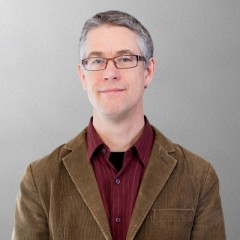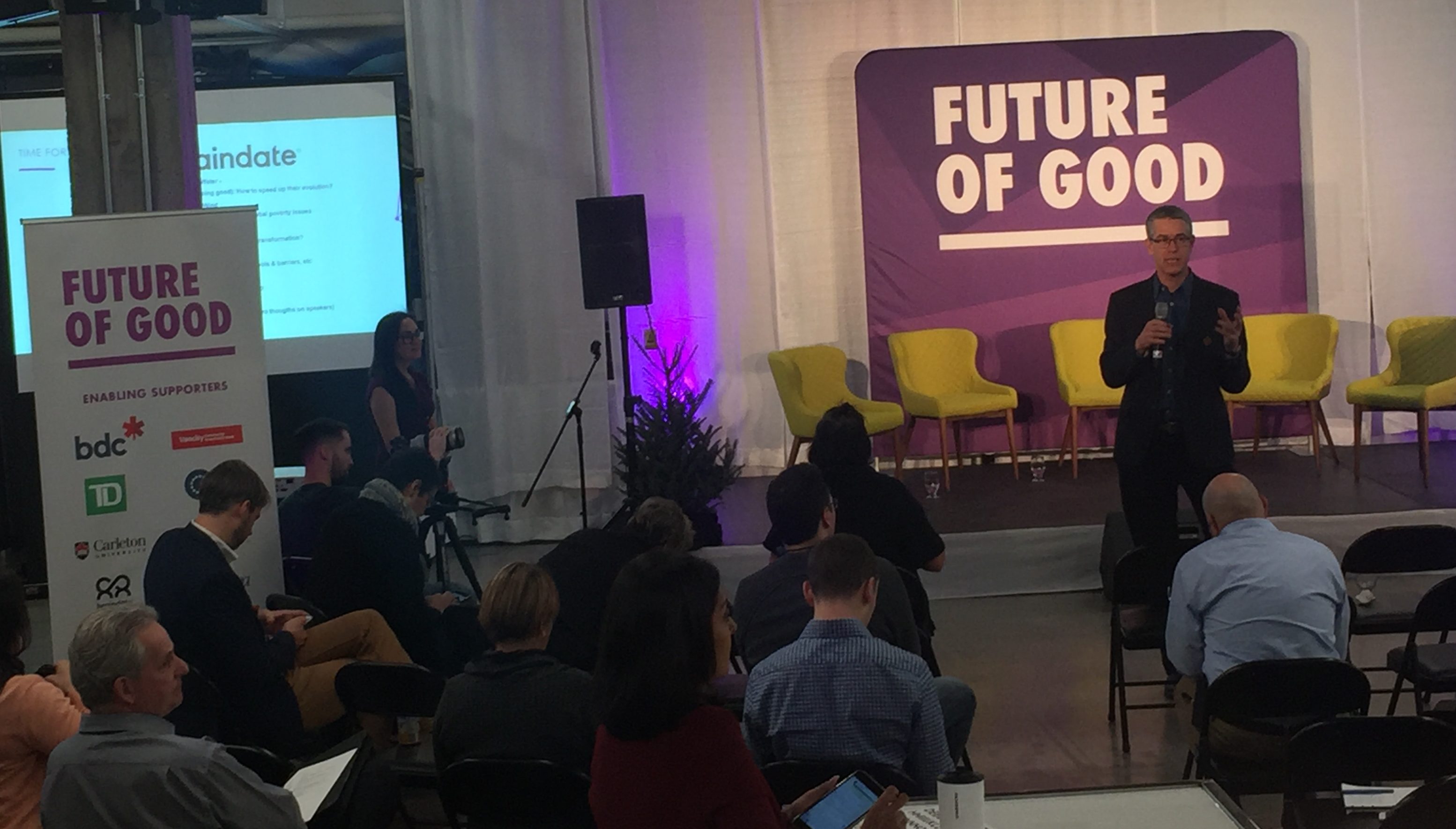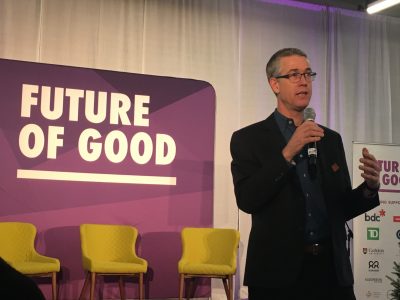When you think about what might improve our future for the better, what pops into your mind?

Peter Andree is the Principal Investigator of CFICE.
For CFICE Principal Investigator Peter Andrée, it’s more ‘community-first’ community engagement.
On Thursday, November 30th, Andrée shared this sentiment at the Future of Good conference, in Ottawa, ON. The conference describes itself as “…two days of radical speakers, compelling performances, and intimate conversations to explore forces shaping how we do good in the 21st century.” The event brought together Canadians around core UN sustainable development goals to inspire advancement in areas like climate action, poverty reduction, hunger, and violence against women — all themes with which the CFICE project is intimately familiar.
Andrée attended as a Carleton University representative and was invited to speak to the 100+ conference-goers at lunch on November 30. He shared his thoughts on the importance of community engagement in teaching students practical skills while also giving them hope for the future.
As he put it, “Community Engagement is about giving students practical experience working alongside non-profit, public and private sector partners…and, in my experience, it also gives students a real sense of hope – hope because in the context of the many challenges the world is facing, they can see their work making a difference in the ‘real world’.”
How would YOU define the #FutureOfGood? Share your thoughts using the hashtag, or comment below!

Peter Andree presents to a full room at the Future of Good conference, November 30, 2017.
Future of Good Comments by Peter Andree
First off, I want to thank the organizers for putting together this exciting program designed to challenge us all to think in new ways about the future and how we ‘do good’ together. On behalf of Carleton, and of my colleague Mark Savenkoff, who is the Carleton rep here today, I want to say that Carleton University is proud to support this event.
I want to focus my comments on the future of a university like Carleton, and how this fits in with the goal of building a more inclusive, sustainable world. When people think of the future of universities, they often think of online teaching, and of how we’re using the web to make education more inclusive and accessible in rural communities, First Nations’ communities, and beyond. On-line teaching is an important part of the future of the university, but today I’m going to talk about another side of the picture: the soft skills, the project management and relationship-building skills that students also need to be successful. My focus is on the growing role that community engagement is playing at Carleton, and what this means for universities as partners in social innovation moving forward.
Community Engagement is about giving students practical experience working alongside non-profit, public and private sector partners to address pressing societal issues. It’s about internships, community service learning courses and community-based research projects that push students to find innovative solutions to the challenges presented to them by community partners. It teaches the soft skills I’m talking about, and, in my experience, it also gives students a real sense of hope – hope because in the context of the many challenges the world is facing, they can see their work making a difference in the ‘real world’.
Community engagement is also about researchers like me working with external partners to ensure that the work we do is grounded in community priorities and community knowledge. Engaged research means that our partners define the research questions, help us analyze the results, and help us mobilize the insights, in real time, through their networks. Community engagement makes research results stronger and more relevant.

Peter Andree presents at the Future of Good conference, November 30, 2017.
Funders like SSHRC and CIHR are increasingly funding partnership-based research and knowledge mobilization projects. The Ontario government has also recognized the value of community-engaged learning, and is now investing significantly in experiential education (which includes community engaged teaching and learning) as a result.
Finally, community engagement is about making our institutions more relevant as a whole.There are a lot of questions these days about the public value of universities. Community engagement is about strengthening our social license by becoming more responsive and, as the JW McConnell Foundation puts it, helping to build the ‘social infrastructure’ of the communities we work in, whether locally in Eastern Ontario or though the partnerships we have around the world.
Let me give you a couple of examples of what community-driven engagement practices look like from a major research project that I lead called ‘Community First: Impacts of Community Engagement (CFICE). CFICE works across Canada to support community-campus partnerships that address Violence against Women, Poverty Reduction, Environmental Sustainability and Food Security. Over the last five years, CFICE has built a strong relationship with Food Secure Canada, the national umbrella organization working to achieve zero hunger and build sustainable food systems in Canada. Our partnership with Food Secure Canada has been instrumental in pushing the federal government to develop an integrated Food Policy for Canada, a process currently underway that includes sixteen government departments and agencies. We now have a MITACS-funded post-doctoral fellow and Carleton grad, Amanda Wilson, based at Food Secure Canada. Amanda is working to ensure that Canada’s first national food policy will be informed by a co-created evidence base grounded in academic knowledge and the experiential knowledge of practitioners working in community-based organizations.
A second example I want to share is the story of one of our local partners, the Ottawa Eco Talent Network. Demographics are shifting. The baby boomers are retiring, and many of them are looking for ways to stay engaged and contribute to a sustainable future for their kids and grandkids. The Ottawa Eco-Talent Network connects local professionals and recent retirees from the civil service and beyond who have spent years working in the environmental field. The OETN connects these mentors with students from Carleton, the University of Ottawa and Algonquin College, to work on sustainability issues in Ottawa. The students get practical skills in these projects and they get solid mentorship. The mentors enjoy connecting with youth and find meaning in contributing to their communities. Ottawa becomes more sustainable, one community project at a time.
These two examples illustrate the type of community engagement that I expect universities like Carleton will continue to invest in as we look to the future and how we do good together.
Thanks for giving me this time today. On behalf of Carleton, I want to thank you all for bringing your energy and passion to this event. I look forward to hearing more about what comes from your discussions, and how Carleton can continue to work with you moving forward.